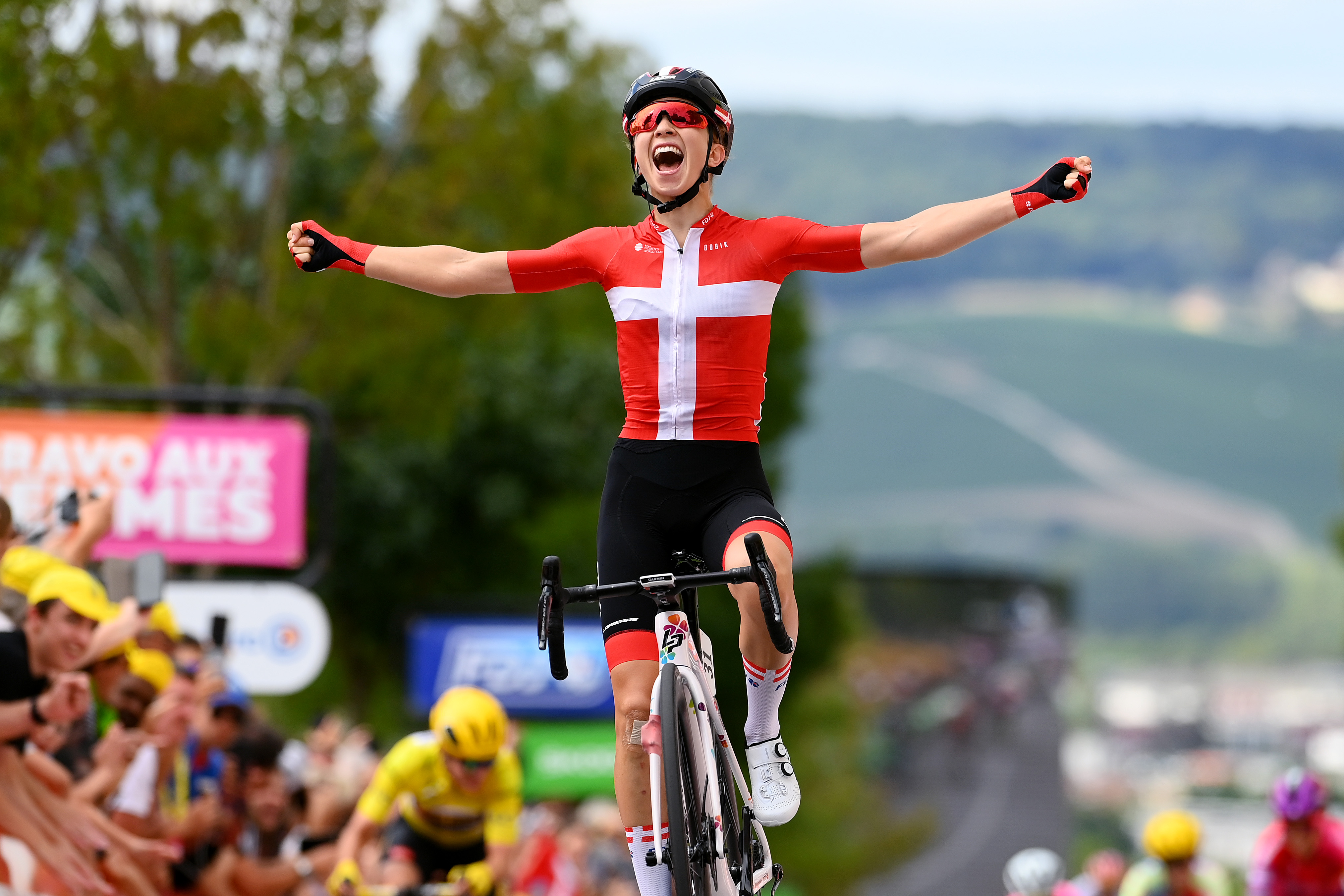Denmark dreaming: Cecilie Uttrup Ludwig and the country's cycling resurgence
The FDJ rider and her male counterparts, from Jonas Vingegaard to Mads Pedersen, are at the top of the sport


Denmark’s Golden Age was a moment of intense productivity in the creative arts in the first half of the 19th century, one that heralded a whole new era in the fields of painting, literature, architecture and music for the Scandinavian country.
Artists like Christen Købke and Martinus Rørbye, authors like Hans Christian Andersen and philosophers like Søren Kierkegaard all came to the fore during the early 19th century, the peak of Denmark’s cultural impact on the planet.
It was a period that came out of decades of instability and uncertainty in Denmark; out of a dearth came a blossoming, a whole new landscape, a new age. To walk around Copenhagen’s Statens Museum for Kunst, its version of the National Gallery, is to see a country that had confidence, a purpose, a role in the world. It ended, as all epochs do, as boom turned into bust with territorial wars with the upstart Prussian Empire, but while it lasted, times were good.
One thing that this Golden Age was missing was women, it being the early 19th century. However, at the forefront of Denmark’s Golden Age of Cycling, which is happening right now, is a woman, Cecilie Uttrup Ludwig. Her win on stage three of the inaugural Tour de France Femmes avec Zwift confirmed her as one of the most exciting riders in the women’s peloton.
There were just five different winners across the five stages, and Uttrup Ludwig was one of only two of those five who weren’t from the Netherlands, the powerhouse of female bike racing for, seemingly, ever.
The image of her victory, crossing the line with arms outstretched in her Danish national champion’s jersey, might well go on to inspire the next generation of young women in the northern European nation.
Thinking about the win – only her second at Women’s WorldTour level, for all her promise – moves Uttrup Ludwig.
The latest race content, interviews, features, reviews and expert buying guides, direct to your inbox!
“It’s definitely one of the best wins I’ve had,” she tells Cycling Weekly from her home in Girona, Spain. “It still brings me a lot of emotions thinking back to it. We had Eurosport France following us during that week and they made a documentary about us during the Tour. We were watching it at a team gathering in October, and I was crying. It brings me so many emotions, it’s quite incredible.
“It’s difficult winning bike races, and I think everyone in that peloton wanted to win a Tour de France stage. All the days were so nervous, there’s no other race like it. Everyone knows what the Tour is, even my grandma, so winning a stage in the biggest race is something very cool.”
The victory came at the end of a long, tough, lumpy day from Reims to Épernay, and from an elite group that contained the yellow jersey, Marianne Vos, and the eventual overall winner, Annemiek van Vleuten. It also followed an opening couple of days of the Tour where things had been tough for Uttrup Ludwig’s FDJ-Suez- Futuroscope team, with her losing lots of time on GC on stage two, and Marta Cavalli being forced to abandon.
Even with 200 metres to go, the Dane looked out of it, with Vos, Ashleigh Moolman Pasio and Kasia Niewiadoma looking like they were in the driving seat, but Uttrup Ludwig would surge around the trio in the final 100 metres, to take the biggest win of her career.
“It was an amazing summer, but I guess the Tour win was the most special…” she explains. “The Tour definitely stands out as the highlight of the season. It was more the circumstances of that day having lost so much time on GC, and having lost Marta [Cavalli] the day before, and everything looking so black and dark, and the team being so down. The day after, to win, to go through such a roller coaster, was very special and kind of amazing.
“I didn’t know I had won until I had almost crossed the line. OK, the last few metres, when I couldn’t see anyone, but it was not until I crossed the line when I was like, ‘Did this happen?’ I didn’t really think that much, it was just getting to the line. I wanted to make sure no one could overtake me, I wanted this so bad. I was just fighting.”
Watching it back, this is what it looks like, that Uttrup Ludwig just wants it more than the other riders. Few would have bet on her in that finale, but she came out on top.
It didn’t end there, either, with the Tour of Scandinavia following just over a week later. Not only did the 27-year-old win another Women’s WorldTour stage, but she won overall, her first general classification win at this level. It helped that the startlist was a little weaker thanks to the Tour having just finished, but it was still not a result to sniff at. Even bigger things will come for her.
Success across the genders

Uttrup Ludwig’s golden summer was part of a wider flush of Danish success in cycling in 2022. There might not be as many elite female cyclists, but this is a sport that’s still growing. Emma Norsgaard of Movistar, aged 23, is a coming force in the sport, with 12 wins already, and Amalie Dideriksen, Denmark’s only ever road world champion, is still only 26 and is looking to relaunch her career at Uno-X in 2023.
“Year-by-year we’re [women’s cycling] getting more viewers, and it also is down to the fact it’s more accessible now, something that has only happened in the last two years,” Uttrup Ludwig says. “It’s cool that the popularity is growing, it’s what it needs to be sustainable.
“I believe that Jonas Vingegaard winning the Tour de France will improve cycling in general in Denmark, and also help young girls get into it. Maybe not next year, but there will be more women’s cyclists coming from Denmark too.”
That’s the big one for Denmark: Vingegaard’s Tour de France win, the second ever for the country, and also coming in the same year that the men’s race began in Copenhagen.
“People have to grasp the enormity of the fact that the time the Tour started in Denmark we had a Dane winning the entire thing,” Danish cycling journalist Rasmus Nowak Franklin says. “The story is so powerful. People were thrilled by the Grand Départ, and the hype was still there when Vingegaard came back later.”
In men’s cycling, it is not just Vingegaard either, who won two stages on his way to overall victory over Tadej Pogačar at the Tour in July. There’s Mads Pedersen, who finally lived up to the promise he displayed winning the World Championships in 2019; he won a stage at the Tour, too, and then three at the Vuelta a España. Meanwhile, Magnus Cort dazzled in the polka-dot jersey at the Tour, and also won a stage. There are also riders like Kasper Asgreen and Søren Kragh Andersen, who have more to give.
“We are still a pretty small country,” Nowak Franklin points out. “I would say we haven’t seen the level that cycling is at now ever; I dare say that even in the 90s they were not as good, and there weren’t as many great cyclists as there are now. People have really gotten into cycling in the last couple of years; I’ve seen it grow with the results they are pulling off.”
The combined population of France, Spain and Italy – the sport’s traditional heartlands and the hosts of cycling’s Grand Tours – is 174.29 million. These three countries won just eight of the 63 stages on offer at the Tour, the Vuelta, and the Giro d’Italia. Just 5.83 million live in Denmark, but the nation has won seven stages at this year’s Grand Tours, and overall victory at the Tour.
“We have a good generation, who can keep going for maybe five to 10 years, but then it will start slowing down again for sure,” Franklink warns. “But we have so many great cyclists at the moment, there’s enough people that can deliver a great season. We have such a variety of riders who can perform. But will the next generation be as great? Probably not.”
However, there is still more growth to come, in women’s cycling especially. A trip to Copenhagen will tell you how much the Danes love their bikes, and there must be more talent out there than the five Danish women on WorldTour teams. Comparatively, there are 17 Danish men on WorldTour teams in 2023, which just cements how in vogue they are at the moment.
“The odd thing about women’s cycling right now is that we have fewer WorldTour riders than for many years, but those that we have are great characters,” Franklin says. “That carries the sport onwards.
“I think we can keep it up, and foster greater riders. But this generation we have now might be the best we have for 50 years. The collective we have is exceptional. It seems like WorldTour teams are picking up all the Danes, which is only good for Danish riders.”

Adam is Cycling Weekly’s news editor – his greatest love is road racing but as long as he is cycling, he's happy. Before joining CW in 2021 he spent two years writing for Procycling. He's usually out and about on the roads of Bristol and its surrounds.
Before cycling took over his professional life, he covered ecclesiastical matters at the world’s largest Anglican newspaper and politics at Business Insider. Don't ask how that is related to riding bikes.